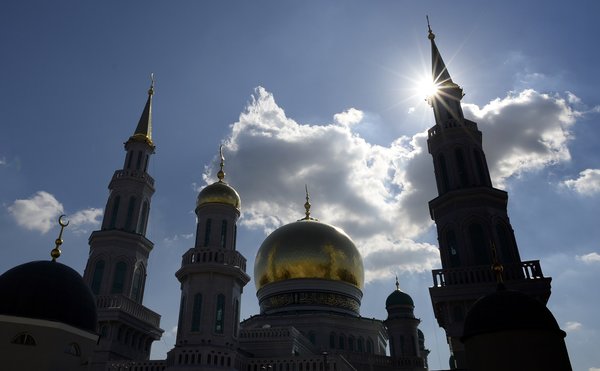
Growing Number of Russian Converts to Islam Joining Insurgents at Home and Abroad
Publication: Eurasia Daily Monitor Volume: 12 Issue: 226
By:

With 28-year-old Anatoly Zemlyanka’s notorious killing of 23-year-old member Magomed Khasiev, ethnic-Russian Muslims are again in the spotlight. Khasiev (a. k. a. Yevgeny Yudin), an ethnic-Russian convert to Islam, came from the Ural region in Russia, while Zemlyanka came from the Siberian town of Noyabrsk. Both men were allegedly members of the Islamic State (IS) and Khasiev was murdered by the IS for supposedly being a mole of the Federal Security Service (FSB) (see EDM, December 10). In recent years, ethnic-Russian militants have featured in numerous reports about government special operations against the insurgency in the North Caucasus. Two of the 11 militants killed on November 22, in one of the latest special operations in Kabardino-Balkaria, were ethnic-Russian converts to Islam (Kavkazsky Uzel, November 24).
The radicalism of Muslim converts is quite widespread not only in the North Caucasus, but across Russia. Each case of an ethnic Russian’s potential or actual involvement with jihadists is widely publicized and discussed inside the country. Varvara Karaulova (19), who attempted to leave for Syria to take part in jihad, is one such case (Onkavkaz.com, June 9). Some Russian analysts say the increase in the number of “Russian Wahhabis” is related to religious extremist propaganda in Russian prisons, and that young Russians between 18 and 30 years old are in the high-risk group (Regnum, October 11, 2012). Ethnic Russians converting to Islam is not a mass process, but 10,000 Russians have done so over the past 15 years (Islamnews.ru, January 31, 2014).
It does not follow that all 10,000 of the ethnic-Russian Muslims are radicals, but some of them reject the officially approved Muslim communities because of their collaboration with the government. There are 54,277 ethnic-Russian Muslims in neighboring Kazakhstan, according to census data (Stat.kz, 2009). Thus, it appears there are 20 times fewer ethnic Russians in Kazakhstan than in Russia, but the percentage of Muslim converts among those in Russia is five times greater. According to the pro-Kremlin analyst Roman Silantyev, radical Islamists comprise up to 5 percent of all Muslims in Russia, or 700,000 out of 14 million. Moreover, according to Silantyev, there are more radicals in such areas of Russia as Saratov oblast as the Far East than in Chechnya (Pravoslavie.ru, September 9, 2014). Entire districts of the Ural region and especially Tatarstan have reportedly come under the control of the Salafists (Rusrep.ru, October 31, 2013). This trend is also notable in Astrakhan where, according to some sources, there are up to 1,000 Russian Salafists (Riss.ru, January 26, 2014).
While the Muslim community in Russia in general is quite apolitical, the number of Islamic radicals may be even greater than previously thought. Between 14 million and 20 million Muslims live in Russia, but they do not have a parliamentary faction, political party or even a unified Muslim organization. Muslims in Russia have no nationwide TV, radio or print media. It is not surprising that Muslim communities across Russia live their lives focused on the local level and try to resolve their problems locally.
According to Eva Rogaar, a Dutch researcher on Islam in Russia, for the Russian converts “Islam provides answers to many of their questions and offers a clear alternative model of development of the society and the government, and most of all of their personality” (Islamnews.ru, November 12, 2014). Ethnic Russians who convert to Islam do not stop feeling that they are ethnic Russians, and this comes into conflict with one of the primary tenets of the Russian Orthodox Church—namely, that an ethnic Russian should be Russian Orthodox. The mufti of Sverdlovsk oblast, Nikolai Asharin, along with the head of the public relations department of the Union of Muslims of Volgograd oblast, Vladimir Zarubin, and many others, disagree with this assumption (Islamnews.ru, November 18, 2014). Some researchers think that ethnic-Russian converts to Islam are the intellectual elite of Russia (Magazines.russ.ru, 2012, #10). However, this hardly applies to the ethnic Russians fighting in the ranks of the North Caucasus insurgency and Syria. Rather, those individuals are people who were not well integrated into society.
Researchers of Islam in Russia do not give a clear answer to the puzzle of why the radical form of Islam is particularly attractive to ethnic-Russian converts. This is a particularly pressing issue, given that those Russian jihadists who are fighting in Syria will try to return to Russia and the country will have to face them. The conversion of ethnic Russians to Islam changes the situation substantially. Islam in Russia, which has traditionally been associated with the people from the Caucasus or Central Asia, is now associated with some ethnic Russians who were thought to belong to Russian Orthodoxy by default. Ethnic-Russian Muslims strive to prove that they are more Muslim than those who were born Muslim. Unlike those who are Muslims by birth, ethnic-Russian converts to Islam feel they have to attain their place within the Muslim society. Hence, some young converts try to prove their Muslim credentials by taking up arms. This also changes the armed underground movement.
Ethnic-Russian Muslims have a psychology that is different from the North Caucasians and the Tatars, and they can have a large impact on the formation of new institutions within the Russian Muslim community. Ethnic-Russian Muslims will become a major headache for the authorities, who have become used to dealing with North Caucasian and Tatar Islamic radicalism, but are not prepared to deal with ethnic-Russian Islamic radicals.




